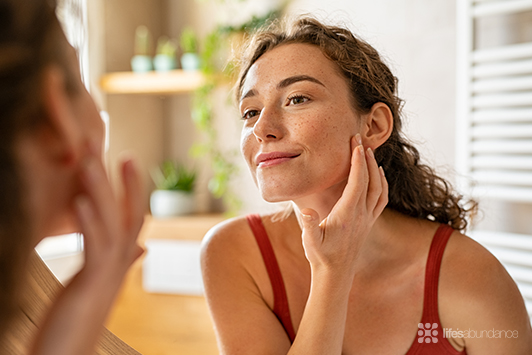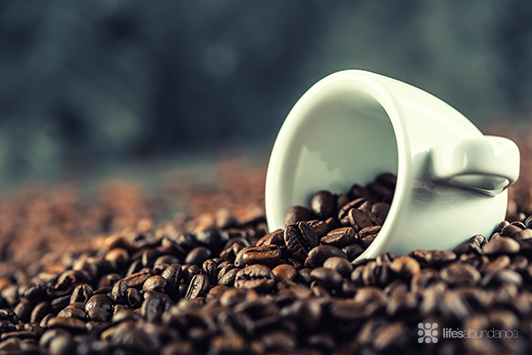
Is caffeine bad for your skin? Discover if it’s a skin villain or just a myth.
"Caffeine ages you."
"No, caffeine is full of antioxidants that keep you young!"
If you've spent more than five minutes online, you've probably seen both of these takes—and maybe even a few heated debates in the comments. When it comes to caffeine and aging, the internet can't seem to make up its mind.
The truth? It's complicated.
Whether or not caffeine "ages" you depends on what kind of aging we're talking about. If you're thinking about your skin—like fine lines, wrinkles, or dullness—there's some evidence caffeine may contribute. But when it comes to how you feel and function as you get older, some effects of caffeine may actually support a more graceful aging process. It's not all doom and gloom—or miracle elixir.
In this post, we're going to unpack the conversation—what's worth paying attention to, what might be overblown, and how to keep feeling (and looking) your best… with or without your favorite cup of joe.
Is caffeine bad for your skin?
Let's be real: if you're here, you're probably not downing energy drinks and wondering what they're doing to your pores. Most of us are talking about coffee—the comforting ritual, the daily pick-me-up, the thing we swear doesn't affect our sleep.
The good news? Coffee and caffeine aren't "bad" for your skin in any dramatic or dangerous way. But there are a few ways they might influence how your skin looks and feels over time—especially if your intake is high or you're already dealing with things like dryness, breakouts, or sensitivity.
Here's how it could show up:
1. Dehydration & Dullness
It's a common belief that caffeine dehydrates your body—and by extension, your skin—but this idea has been largely overstated. While caffeine does have mild diuretic effects, research shows these are unlikely to cause actual dehydration in regular coffee or tea drinkers. That said, if you're replacing all your water intake with lattes, it might contribute to a dull, tired complexion. Hydration still matters for skin health—and caffeine isn't a replacement for a tall glass of water.
2. Stress & Cortisol
Caffeine gives your system a boost—sometimes too much of one. It can raise cortisol levels (your body's main stress hormone), which may increase oil production, trigger inflammation, and even interfere with collagen over time. That doesn't mean one cappuccino equals crow's feet, but if your stress levels are already high, caffeine could be adding fuel to the fire.
3. Sleep Struggles = Skin Struggles
Coffee too late in the day can mess with your sleep—and your skin loves sleep. That's when it repairs itself, restores moisture balance, and does all the behind-the-scenes work that keeps you glowing. Skimp on sleep, and your skin might look duller, puffier, or more prone to irritation the next day (and the day after that).
4. It's Not Just the Coffee… It's the Routine
It's worth zooming out. If your coffee habit comes with sugary syrups, skipped meals, stress-fueled gulping, or not enough water, those lifestyle pieces may be what's really showing up on your skin. The caffeine is part of the picture, but it's rarely the full story.
So yes—caffeine might contribute to some skin stress in certain situations. But that's not the whole picture. In fact, some research suggests it could play a surprisingly helpful role when it comes to aging gracefully.

We’ve seen the wrinkle claims—still not giving up our coffee.
Is caffeine good for you?
Could caffeine actually be... helpful?
We tend to think of it as a guilty pleasure, but in some cases, caffeine might offer surprising perks—especially when it comes to how we age. No bold claims here, just a few reasons your morning cup could be doing more than just waking you up.
Here's where things get interesting:
1. Antioxidants, Anyone?
Coffee is one of the richest sources of antioxidants in many people's diets—even more than fruits and veggies for some folks. Antioxidants help neutralize free radicals, which are unstable molecules that can contribute to premature aging and cellular damage. In other words, that morning cup might come with a side of skin-protective benefits.
2. Mental Boosts, Mood Lifts
Let's not underestimate the power of feeling good. Caffeine may improve focus, energy, and even mood—and when you're feeling better, you're often taking better care of yourself, too. That could mean a more consistent skincare routine, more movement, or simply fewer stress wrinkles.
3. Energy, Activity, and Overall Vitality
Caffeine's best-known benefit? A jolt of energy. And for many people, that means more physical activity, better moods, and staying mentally sharp—all things that can help you feel more youthful, and sometimes look the part too. The connection might be indirect, but when caffeine helps power your workouts, clear your brain fog, or boost your motivation to take care of yourself… it adds up.
4. Bonus Perk: It's a Ritual
The ritual of brewing and sipping your favorite cup can be grounding. That moment of mindfulness might not be anti-aging in a clinical sense, but it's the kind of emotional nourishment that plays a real part in long-term wellness.
So what gives? Caffeine's relationship with aging isn't black and white. It's a sliding scale—one that depends on how much you consume, what else is going on in your life, and how your body responds to it.
But here's the headline: caffeine isn't the enemy. And with a little balance, it might even be an unexpected ally in your aging journey.
So… does caffeine age you?
The verdict? It's complicated. Caffeine isn't the skin villain some headlines make it out to be—but it's not a magical youth elixir either. It lives somewhere in the middle, where context, balance, and your unique biology matter more than blanket rules.
Yes, caffeine can affect things like sleep and stress, which may impact how your skin looks and feels over time. But it also offers mood-lifting, antioxidant-rich benefits that support energy, mental sharpness, and even a little glow-up from the inside out.
And if you're like most of us—not giving up your morning ritual anytime soon—but still craving a skincare boost? A nourishing, hydrating facial serum can help counteract dryness, dullness, and environmental stressors so your skin stays soft, smooth, and radiant (no matter how you take your coffee).
Aging well isn't about perfection—it's about stacking small, supportive choices that add up. So go ahead. Sip the latte. Just don't forget the hydrating serum.
If you found this interesting, check out these related stories:
Why You Need Facial Oil in Your Skin Care Routine
Maximize Your Mornings with this Chocolate Protein Coffee Recipe